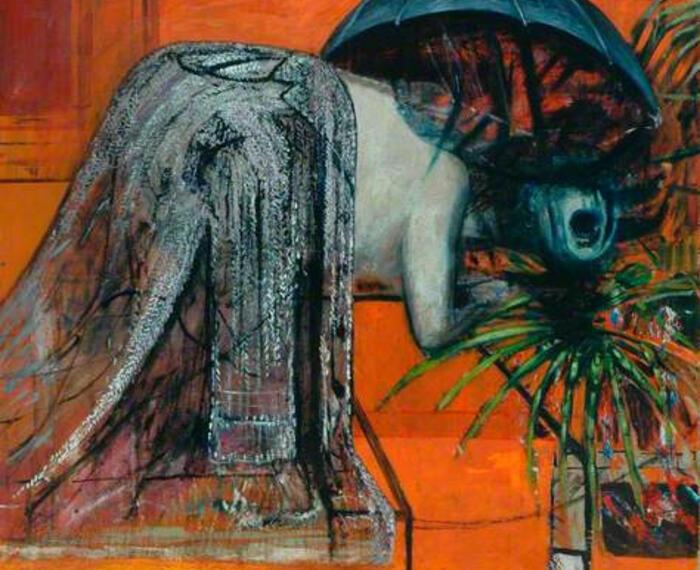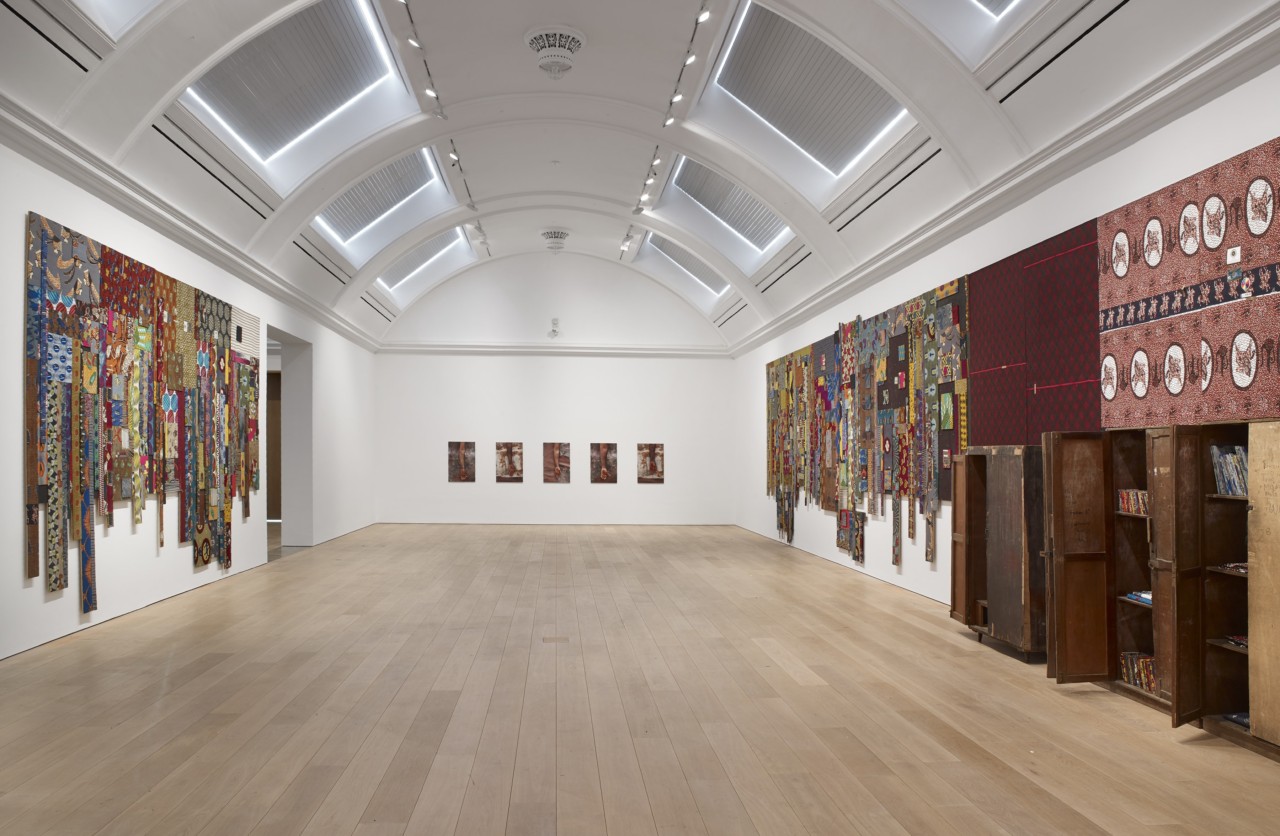


Parliament of Ghosts by Ibrahim Mahama at MIF19. Image credit Michael Pollard
Ibrahim Mahama (b. 1987) may be relatively young, but he has already built a reputation as one of the most renowned Ghanaian artists working today. Best known for his spectacular installations in which he covers monumental buildings – for example at Documenta 14 – with discarded jute-sacks commonly used in Ghana to transport cocoa and other commodities, his practice mainly explores Ghana’s colonial history and how notions of trade, labour and export connect his home country with the rest of the world.
By filling up the Whitworth with scrap material from his home country’s now defunct railway system, built under British Colonial Rule to transport the country’s exports of cocoa, manganese and timber, Mahama’s first solo-exhibition in the UK brings some of Britain and Ghana’s shared and half-forgotten histories back to life.
The exhibition is called Parliament of Ghosts, and its centrepiece is a colossal, parliament-like arrangement of worn plastic train seats taken from abandoned railway carriages. We are encouraged to make use of them, to debate, to perform, or just sit quietly and reflect.
It is equally fascinating to scan through faded logbooks, maps, old school books and black and white photographs of railway workers, displayed in wooden cupboards that look like old school cabinets. These are all residues from the archive of the railway station in Sekondi, where the original headquarters of the Gold Coast Railway was located.
The wall text in the exhibition space outlines that the fibre-glass seats, like the trains themselves, were most likely made in Manchester or Leeds and the rough wood for the archive cupboards probably exported from Britain at a time when Europe imported luxury woods such as mahogany from West Africa.
Another space contains a giant silo, modelled on the huge unused concrete structures built under Kwame Nkrumah, Ghana’s first president, to store cocoa. There we are invited to immerse ourselves in a seven-channel film installation that includes re-enactments of old parliamentary debates from the early years of Ghanaian independence (1957), read by Mahama’s collaborators in Sekondi.
Photographs in the next room display the muscular underarms of workers who are forced to travel from their villages in the North of Ghana, where Mahama is from, to the capital to find labour. We can see that the men tattooed their names and the contact details of their relatives onto their arms as a safety measure, in case they are injured or die on the building sites or streets of Accra.
A further room features large scale paintings, employing textiles and wood traces, gathered from Ghana’s urban environment.
The parliament, silo and archives seem to be encrusted with history. They are ghostly reminders of Ghanaian and British industrial and colonial histories and the West African country’s hopes and struggles for independence since the 1960s. The accumulation of the decaying residues of British Colonial rule – the interiors from a railway system that no longer functions, the exercise books of students long gone and the empty lockers from abandoned industrial sites, all piled up and accumulated in the exhibition space – could remind us of a graveyard.
However, Ibrahim Mahama is very clear that this is not his intention. He sees his Parliament of Ghosts as a starting point to reflect on the potential that lies within failure, and as a platform to establish new ways of thinking about what the future can hold.
It is evident that Mahama’s practice has a strong community building intent. With the funds the artist earns through exhibitions or sales in the ‘Western’ Art World, he has been able to set up large-scale workshops in local abandoned warehouses and industrial sites in his hometown, employing local men and woman as collaborators in his art work, which means they need no longer to travel far to find employment.
His idea of opening up new kinds of possibilities through art corresponds with the Whitworth’s mission to use art for social change. Mahama’s installations not only empower people in Ghana, but also invite the exhibition visitors and the wider community in Manchester to be active participants or collaborators. Last Saturday a group of residents from north Manchester staged a public discussion called ‘Talking Points’ about the theme of power in Mahama’s Parliament of Ghosts, an intervention that seems particularly relevant this month when the UK’s parliament has been suspended and the Supreme Court is debating whether this was lawful.
Go see this show before it closes next weekend. Parliament of Ghosts is a timely meditation on the legacy of colonialism, about Ghana’s and the overall continent’s struggle to chart its’ own paths since independence, and last but not least a powerful tool to rethink topics that are relevant in our present time.
Christine Takengny
Curator
The Whitworth, Oxford Road, Manchester M15 6ER. Open Monday-Sunday 10.00-17.00, open on Thursdays until 21.00. Exhibition continues until 29 September 2019. www.whitworth.manchester.ac.uk